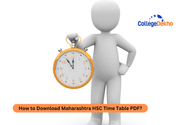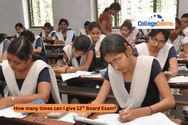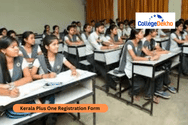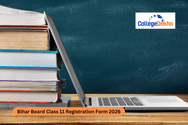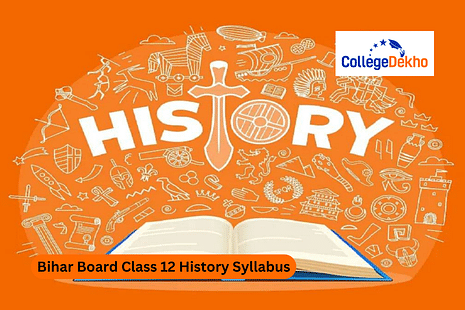

Never Miss an Exam Update
Bihar Board Class 12 History Syllabus 2025-26:
The Bihar Board 12th History syllabus 2024-25 contains three parts, including chapters such as Harappan Civilisation. Early States and Economies, Early Societies, Cultural Developments, Traveller Accounts, Bhakti-Sufi Traditions, Vijayanagara Capital, and more. Candidates can download the syllabus PDF from the official website. The Bihar Board Class 12 History exam is tentatively scheduled for February 2026. Students pursuing the Humanities/Arts stream under the BSEB can view the complete syllabus contents here. Before beginning their preparations, they should be familiar with the syllabus for all topics and the distribution of marks.
BSEB Class 12 History Syllabus 2025-26 PDF includes the course structure, course content in a unit-wise format, internal assessment details, list of map works, question paper design and project work details. Bihar Board Class 12 History Syllabus 2025-26 contains 15 chapters: The weightage of Part-1 is 24 marks and of Part-2 & 3 is 25 each. Other than that, the maps will be of 6 marks and project work will carry 20 marks. Read the article to know more about the detailed Bihar board class 12 history syllabus 2025-26.
Bihar Board Class 12 History Syllabus 2025-26 Themes
The table below consists of various themes in BSEB Class 12 History Syllabus 2025-26.Themes in Indian History Part—I 24 Marks | ||
|---|---|---|
Theme No. | Theme Title | Marks |
1 | Harappan Archaeology | 24 |
2 | Political and Economic History: How inscriptions tell a story | |
3 | Social Histories: using the Mahabharta | |
4 | A history of Buddhism: Sanchi Stupa | |
Themes in Indian History Part—II 25 Marks | ||
5 | Medieval Society through Travellers Accounts | 25 |
6 | Religious Histories: The Bhakti- Sufi tradition | |
7 | New Architecture: Hampi | |
8 | Agrarian Relations: The Ain-i-Akbari | |
9 | The Mughal court: Reconstructing histories through chronicles | |
Themes in Indian History Part—III 25 Marks | ||
10 | Colonialism and Rural Society | 25 |
11 | Representations of 1857 | |
12 | Colonialism and Indian Towns | |
13 | Mahatma Gandhi through Contemporary Eyes | |
14 | Partition trough oral sources | |
15. | The Making of the Constitution | |
Including Map work of the related Themes | 06 | |
Theory Total | 80 | |
Project Work | 20 | |
Total | 100 | |
Bihar Board Class 12 History Syllabus 2025-26 Theme Wise Syllabus
The table below consists of theme wise syllabus of BSEB Class 12 History syllabus 2025-26.Theme No. and Title | Learning outcome with specific competencies |
|---|---|
Themes in Indian History Part—I | |
| The Story of the First Cities: Harappan Archaelogy |
|
| Political and Economic History: How Inscriptions tell a story. |
|
| Social Histories: Using the Mahabharta |
|
| A History of Buddhism: Sanchi Stupa |
|
| |
Themes in Indian History Part—II | |
| Medieval Society through Travellers Accounts |
|
BHAKTI –SUFI TRADITIONS Changes in Religious Beliefs and Devotional Texts (c. eighth to eighteenth centuries) |
|
New Architecture: Hampi |
|
Agrarian Relations: The Ain-i-Akbari |
|
The Mughal Court |
Introduce the learner to the key moments in political history.
|
Themes in Indian History Part—III | |
COLONIALISM AND THE COUNTRYSIDE Exploring Official Archives |
|
REBELS AND THE RAJ: 1857 Revolt and its Representations |
|
MAHATMA GANDHI AND THE NATIONALIST MOVEMENT Civil Disobedience and Beyond |
|
Framing of the Constitution |
|
Also Check Bihar Board 12th Exam Pattern 2024
Bihar Board Class 12 History Syllabus 2025-26 Mapping
The BSEB Class 12 History syllabus is a comprehensive and challenging course. It covers a wide range of topics, from the ancient to the modern, and it includes a significant practical component, which allows students to apply their theoretical knowledge to real-world situations. The table below consists of BSEB Class 12 History syllabus 2025-26 mapping.
Book | Page no. details | Map work |
|---|---|---|
1. | Page 2 | Mature Harappan sites: Harappa, Banawali, Kalibangan, Balakot, Rakhigarhi, Dholavira, Nageshwar, Lothal, Mohenjodaro, Chanhudaro, KotDiji. |
Page 30 | Mahajanapada and cities: Vajji, Magadha, Kosala, Kuru, Panchala, Gandhara, Avanti, Rajgir, Ujjain, Taxila, Varanasi. | |
Page 33 | Ashokan inscriptions are spread among the Kushana, Shaka, Satavahana, Vakataka, and Gupta civilizations. Cities/towns: Braghukachchha, Kannauj, Puhar, Mathura Inscriptions on pillars, include Sanchi, Topra, Meerut, and Kaushambi. Chola, Chera, and Pandyan kingdoms. | |
Page 43 | Important kingdoms and towns: Kushanas, Shakas, Satavahanas, Vakatakas,Guptas. Cities/towns: Mathura, Kanauj, Puhar, Braghukachchha, Shravasti, Rajgir, Vaishali, Varanasi,Vidisha | |
Page 95 | Major Buddhist Sites: Nagarjunakonda, Sanchi, Amaravati, Lumbini, Nasik, Bharhut, BodhGaya, Shravasti, Ajanta. | |
Book 2 | Page 174 | Bidar, Golconda, Bijapur, Vijayanagar, Chandragiri, Kanchipuram, Mysore, Thanjavur, Kolar, Tirunelveli, Quilon. |
Pag 214 | Territories under Babur, Akbar and Aurangzeb: Delhi, Agra, Panipat, Amber, Ajmer, Lahore, Goa. | |
Book 3 | Page 297 | Territories/cities under British Control in 1857: Punjab, Sindh, Bombay, Madras Fort St. David, Masulipatam, Berar, Bengal, Bihar, Orissa, Avadh, Surat, Calcutta, Daccan, Patna, Benaras, Allahabad and Lucknow. |
Page 305 | Main centres of the Revolt of 1857: Delhi, Meerut, Jhansi, Lucknow, Kanpur, Azamgarh, Calcutta, Benaras, Gwalior, Jabalpur, Agra, Avadh. | |
Important centres of the National Movement: Champaran, Kheda, Ahmedabad, Benaras, Amritsar, ChauriChaura, Lahore, Bardoli, Dandi, Bombay (Quit India Resolution), Karachi. |
Download Bihar Board 12th Previous Year Question Paper
BSEB Class 12 History Syllabus 2025-26 Project Work
History is one of the most significant disciplines taught in schools. We can better comprehend the present and make plans for the future by studying the past. It advances historical knowledge throughout all cultures. The objective of the BSEB Class 12 History Syllabus is to show students that history is more than merely a collection of information; it is an important topic, an approach to inquiry, and a way to learn about the past. Their understanding of how a historian collects, chooses, examines, and compiles a variety of sources to write history is aided by the course syllabus.Each book and chapter is important from the exam perspective but Part III: Themes in Indian History III (Morden India) is an important portion of the Bihar Board Class 12 History syllabus.
FAQs
The Bihar Board Class 12 History exam paper will contain 100 objective questions. Students are required to attempt any 50 of the 100 questions in the objective section.
The marks weightage for Bihar Board Class 12 History Syllabus 2025-26 is as follows:
- Part I: Themes in Indian History I - 25 Marks
- Part II: Themes in Indian History II - 30 Marks
- Part III: Themes in Indian History III - 45 Marks
There won't be any project or practical work required for the Bihar Board Class 12 History subject. There will be 100 marks available for the theory paper.
Part III: Themes in Indian History III (Morden India) is a significant section of the Bihar Board Class 12 History syllabus, but all books and chapters are significant for exam purposes. Part III carries a weightage of 45 marks in the syllabus.
The Bihar Board Class 12 History Syllabus 2025-26 includes a map component, however there aren't as many map-based exam questions. It is recommended that students complete the map work to get ready for the history exam.






